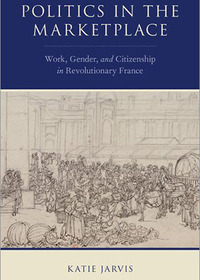
- University of Notre Dame
- Assistant Professor
- Residential Fellow (2016-2017)
- “Citizenship as Social Experience: Economics, Gender, and Politics in Revolutionary France”
Katie Jarvis is Assistant Professor of European History at the University of Notre Dame. She is a historian of early and late modern France. Her research focuses on popular politics, broadly conceived, during the French Revolution. She is especially interested in the intersection of social and cultural history, as well as gender history. She teaches courses on French and European history from the seventeenth century to the present.
Jarvis’s current manuscript, Politics in the Marketplace: Work, Gender, and Citizenship in Revolutionary France, emanates from Parisian market women called the Dames des Halles during the French Revolution. Using the Dames as a lens, she asks how the revolutionaries negotiated the dual rise of democratic aspirations and capitalism through their everyday trade. She probes how the Dames invented a notion of nascent citizenship that took work, rather than gender, as its cornerstone. Simultaneously, she analyzes how the revolutionaries debated the political role of the popular classes through the market women. These crucial contests would engross the French nation — and much of Europe — for decades.
Jarvis has published in La Révolution française (2015) and has co-edited a special journal issue of Genre & Histoire (2016). Jarvis’s forthcoming articles include "Exacting Change: Money, Market Women, and the Crumbling Corporate World in the French Revolution" in the Journal of Social History (2018) and "'Patriotic Discipline': Cloistered Behinds, Public Judgment, and Female Violence in Revolutionary Paris" in the volume Practiced Citizenship: Women, Gender, and the State in Modern France edited by Nimisha Barton and Richard Hopkins. Jarvis has also served as a steering member of a Paris-based workgroup on gender and the popular classes.
Jarvis’s next book project, titled Democratizing Forgiveness: Reconciling the Nation in Revolutionary France, discerns how the revolutionaries reconceptualized and practiced forgiveness during a period of dramatic conflict. Democratizing Forgiveness analyzes how, after wresting the power to pardon from the crown and the cross, the revolutionaries refashioned reconciliation in diverse legal, economic, and political forms. From debt forgiveness to revolutionary catechisms, citizens attempted to repair the broken bonds of everyday life and reconstructed the body politic in the process.
Professor Jarvis’s research has been supported by major fellowships from the Fulbright Association, the American Council of Learned Societies, and the Mellon Foundation/Council for European Studies. Her archival trips have been funded by grants from the Société des Professeurs Français et Francophones d'Amérique, the Institut Français d’Amérique, Baylor University, Phi Alpha Theta, Society for French Historical Studies, and the Western Association of Women Historians. In 2012-2013, she was an ACLS Residency Fellow at the University of Wisconsin Institute for Research in the Humanities. A Gerda Lerner Fellowship in Women’s History as well as a George Mosse Prize Lectureship supported her doctoral work at the University of Wisconsin-Madison.
Publications
-
Politics in the Marketplace: Work, Gender, and Citizenship in Revolutionary France
Oxford University Press, 2019

One of the most dramatic images of the French Revolution is of Parisian market women sloshing through mud and dragging cannons as they marched on Versailles and returned with bread and the king. These market women, the Dames des Halles, sold essential foodstuffs to the residents of the capital but, equally important, through their political and economic engagement, held great revolutionary influence.
Politics in the Marketplace examines how the Dames des Halles invented notions of citizenship through everyday trade. It innovatively interweaves the Dames’ political activism and economic practices to reveal how marketplace actors shaped the nature of nascent democracy and capitalism through daily commerce. While haggling over price controls, fair taxes, and acceptable currency, the Dames and their clients negotiated tenuous economic and social contracts in tandem, remaking longstanding Old Regime practices. In this environment, the Dames conceptualized a type of economic citizenship in which individuals’ activities such as buying goods, selling food, or paying taxes positioned them within the body politic and enabled them to make claims on the state. They insisted that their work as merchants served society and demanded that the state pass favorable regulations for them in return. In addition, they drew on their patriotic work as activists and their gendered work as republican mothers to compel the state to provide practical currency and assist indigent families. Thus, their notion of citizenship portrayed useful work, rather than gender, as the cornerstone of civic legitimacy.
In this original work, Katie Jarvis challenges the interpretation that the Revolution launched an inherently masculine trajectory for citizenship and reexamines work, gender, and citizenship at the cusp of modern democracy.
-
The Cost of Female Citizenship: How Price Controls Gendered Democracy in Revolutionary France
French Historical Studies, 2018
In 1793, the National Convention passed two hallmarks of Jacobin legislation: sweeping price controls called the General Maximum and a ban on women’s political clubs. At the center of both issues were factional clashes among the Montagnards, Girondins, and Enragés, on the one hand, and Parisian market women called the Dames des Halles and the leading women’s club called the Société des Citoyennes Républicaines Révolutionnaires, on the other. Montagnard deputies pointed to marketplace brawls between the Dames and the club women to argue that women were irrational and had no place in formal politics. Consequently, the dominant historiographical narrative frames their ban as codifying Rousseauian gender norms and ideologically stunting women’s citizenship at the outset of French democracy. However, this article analyzes the mechanics of the Maximum to argue that the ban on women’s clubs emerged from contests over price controls, market regulation, and the economic dimensions of citizenship itself.